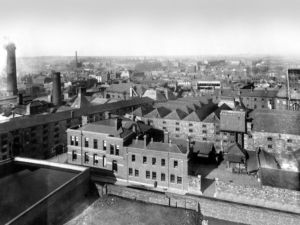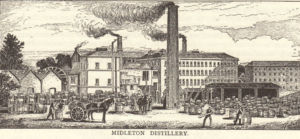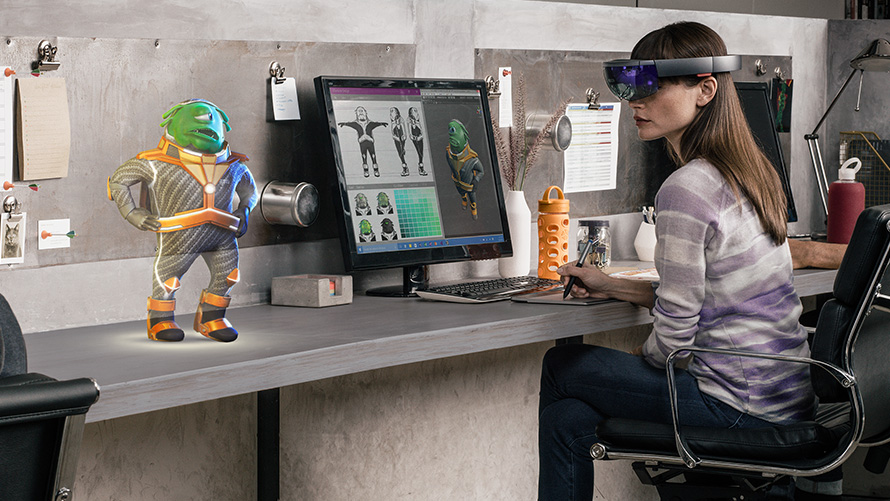ThinkBusiness spoke with Carol Quinn, the archivist for Irish Distillers. Does your business have an archive? Should you start building one?
It sounds like an interesting job, what is it you do?
I’m the archivist for Irish Distillers, and I’m based at Midleton Distillery in Co Cork. I’m the first professionally qualified archivist to hold this role, so it’s been quite a learning curve.
I’m responsible for recording the history of the company and its brands, which includes the records of John Jameson & Son, John Power & Sons and the Cork Distilleries Company – a rich heritage dating to back to the eighteenth century.
What is archiving?
Simply, it’s the management of information. The physical (and increasingly digital) preservation of items, while allowing access to and dissemination of the information they contain. Archives are most usually documents, but information can be held in many formats including maps, plans, paintings, and in my case, bottles.
“A lot of corporate knowledge and experience is lost when employees move on, it needs to be someone’s specific job to record what happens, or you will lose your corporate memory. ”
Why should businesses archive and how can they start?
There are so many benefits to having a corporate archive that I think the question should be – why wouldn’t you archive?
A company’s records can be leveraged to inform and support business activities.
Archives have on-going business potential. In busy workplaces a lot of corporate knowledge and experience is lost when employees move on, it needs to be someone’s specific job to record what happens, or you will lose your corporate memory. At a most basic level, how many companies know the date of their first day of trading? How can you see how far you have come or developed if you don’t have the older information?
Archives are essential tools for understanding and reinforcing a company’s ethos and values. There are so many stories in every company, stories that add colour and provide a human interaction with the consumer, but they need to be recorded. It’s not about having a ‘heritage’ display in a corner; it’s about the active management of a resource, your history.
How can archives drive business results?
At Irish Distillers, I work closely with our innovation team in providing stimulus not only for new products but the packaging design and content.
Consumer response has been incredibly positive to the authenticity of these products; you can visibly see the legacy we are drawing on. This gives us an edge on the newer entrants in the market who don’t have that depth of history and distilling experience to mine.
I also work very closely with our legal and IP department, providing evidence of copyrights and patents in territories across the globe.
Irish whiskey is in the middle of a resurgence now, but a hundred years ago you could just as easily enjoy a glass in Bombay, Cairo or Malaysia as you could in Dublin, and we have the records to prove this.
At one point in 1914, Jameson even had a bottle label made specifically for Honolulu in Hawaii.
What are some of the best business archives in Ireland and where can they be seen?
One of the first things I did when I started at Irish Distillers was to call into my colleague at the Guinness Archive, Eibhlin Colgan. Eibhlin has been blazing the trail for business archives for many years, and she had some great advice to offer. I’m also very impressed by the outreach activity of the ESB Archives in the last few years, I’m a follower of theirs on Twitter, @ESBArchives, and have learnt so much about the modern development of Irish society from what they share.
“It was also a pretty good day when we found original barley grains from 1826 trapped in a notebook belonging to John Jameson II.”
What’s the most interesting thing/story, you have discovered in your job as an archivist?
I always joke that every day is like Christmas as I’m forever opening boxes without knowing what I’ll find inside.
I think for me it’s being able to put flesh on the past. We have over a hundred years of employee records from the Jameson Distillery at Bow Street, and for some of the people employed there in the 1860s and 1870s there is no birth or death documentation, and this is the only paper record of them existing.
Shining a light back on those men and making sure their contribution to our current success is recognised has been rewarding.
It was also a pretty good day when we found original barley grains from 1826 trapped in a notebook belonging to John Jameson II. This led to lots of exciting experimentation at our microdistillery in Midleton.
What would you say to a business interested in starting an archive? First steps?
Get professional advice, and do a survey to see what exactly you have. Once you’ve surveyed your premises and stores to see what’s there, that will inform you as to your next steps regarding what resources you need. Help and guidance can be found in a few places, the Archives and Records Association of Ireland, the UK based Business Archive Council, and there are also some well-established consultancy companies ready to help out.
The best first step though is to collect and save anything you think might be important for your company’s history. Whether it’s saving a significant new business email or taking a picture of your workplace and staff, you never know what might add value in the future.










